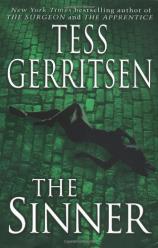Interview: August 15, 2003
August 15, 2003
In this special interview with Bookreporter.com's Suspense/Thriller Author Spotlight Team (Carol Fitzgerald, Joe Hartlaub, and Wiley Saichek), Tess Gerritsen discusses the inspiration behind her latest thriller, THE SINNER, and talks about research methods, fan encounters, and her next book.
BRC: In your essay on our Suspense/Thriller feature you explained that you always had wanted to write about leprosy, and that you saw it was possible to do this in THE SINNER. How much of the book's plot was developed before you added leprosy to the storyline? Or did you start with the concept of leprosy?
Tess Gerritsen: I started out with several different threads I wanted to include in the story. First, I wanted to write about nuns. I've always been fascinated by why a woman would choose to devote her life to a religious order, and I wanted to explore life inside the convent. I knew, right off the bat, that the mystery would open with an attack on a convent --- I just didn't know who the attacker was, or what his motive might be. Second, I wanted to weave into the mystery something to do with leprosy. I had in mind that something the medical examiner discovers on autopsy would provide the key to solving the mystery --- but I just didn't know how that clue would point her in the right direction. So you can see, I really didn't have much of a game-plan to start off with. Just two rather vaguely sketched out elements of the story. In a sense, I worked backwards, building the mystery around the clues, rather than the other way around.
BRC: From leprosy, to environmental issues, to the religious aspects of the story, THE SINNER required an enormous about of research. How do you conduct research for your books?
Tess Gerritsen: I almost always start off simply by reading everything I can get my hands on concerning the topic. For THE SINNER, I read books about women in religious orders --- memoirs, academic studies, and a few historical texts. Next, I spoke to women who had been postulants in various religious orders. I also found several fascinating websites put up by convents, describing their daily routine. For the leprosy information, I relied partly on my own medical experiences, since I've examined leprosy patients in the course of my training as a doctor. I also relied on medical textbooks and historical accounts of leprosy through the ages. I find that research is perhaps the most exciting part of writing a novel, because it's not really work --- it's exploration, and for someone who's as curious as I am, it's like a treasure hunt. You never know what little fact will set off a whole flood of new story ideas.
BRC: THE SINNER is your third novel to feature Jane Rizzoli. What are your plans for the character? Will we be seeing her again in a future book? How about Maura?
Tess Gerritsen: Jane Rizzoli and Maura Isles will both appear in my next novel, BODY DOUBLE. I feel I haven't yet fully explored their characters and I'd love to watch how they grow and develop through several more books.
BRC: You have written that you like to "try to tap into a vein of fear - some premise, some situation, that raises the hair on the back of my neck or gives me a chill." Looking back over the books you've written, which book gave you the biggest chill? Why?
Tess Gerritsen: I think BLOODSTREAM's premise was the one I found personally most chilling --- because it dealt with my fears as a mother. At the time I wrote it, I was having a lot of conflict with my older son, who was a teenager at the time. And I realized that my greatest fear is having my own child turn into some unrecognizable creature. I amplified that into a storyline where the fear is even greater --- that the one you love transform into someone who is out of control and actually dangerous. Yes, of course, I'm afraid of the standard personal danger scenarios --- plane crashes, drowning, etc., --- but the most complex fears, the ones that really play into our emotions and make the best stories, are those that involve love as well.
BRC: Staying on the "fear theme," what other authors and titles have given you chills?
Tess Gerritsen: Mo Hayder's book, THE TREATMENT, was utterly chilling. And Preston and Child's THE RELIC scared me to death. Another scary book that comes straight to mind as super-chilling was Jeff Long's THE DESCENT. I'm not easily scared by novels, and I really do shy away from books that have too much blood and gore. I don't find that nearly as scary as the suspense of wondering: What DOES that monster look like? Once the monster appears, the tension melts away. The most frightening part of a book is before the evil is sighted --- yet you know it's there, and waiting for you.
BRC: Some of your scenes are so intense. While you are writing do you ever need to get up and walk away from the story to get your emotions under control if you are writing something that you know will jar or shake your readers, or can you shrug off what you are writing very easily? How do you relax?
Tess Gerritsen: The odd thing is, when I'm writing scary, intense scenes, I want to just stay at my desk and write. Those are the scenes that keep me moving ahead, keep me focused. It's the in-between scenes, where there's not as much happening, or where I'm building on the story, working toward the next climax, when I find myself taking breaks. I take walks, I read a magazine, I snack. I play my fiddle. I can find plenty of ways to relax. But I'm always hunting for that exquisite moment of tension in a story that will keep me writing.
BRC: West Nile Virus and SARS are two of the current health crises getting a lot of media attention. How closely do you monitor press coverage of medical stories for potential storylines for your future work? Do you contemplate writing about SARS or West Nile Virus in a future novel?
Tess Gerritsen: I read a lot of newspapers and science news, not necessarily for story ideas, but because I'm just curious about what's happening in the world, particularly in the field of medicine. Every so often, though, I'll encounter a news item that will make me think: "Now what IF..." For instance, the stories about Mad Cow Disease a few years ago inspired my book, LIFE SUPPORT. And a news story about creatures called Archaeons, single-celled organisms that live near volcanic vents, was partly what inspired GRAVITY. But I certainly don't restrict myself to science-based stories. Every odd news article, every strange event, makes me wonder how I can use it in a book. At the moment, I have no plans to write about SARS or West Nile virus. But ... you never know.
BRC: You are about to embark on an extensive book tour for THE SINNER, which will take you to Australia and New Zealand as well as U.S. locations. Can you share a favorite fan encounter from your travels over the years?
Tess Gerritsen: Yes! The time a fan practically handed me the premise for my next book. I was on tour for GRAVITY, which is about a biological disaster aboard the International Space Station. This fan said, quite bluntly, "I'm not interested in space stories. I want you to write a book about what I AM interested in." I was pretty taken aback. Imagine a reader commanding you to write something she wants! I asked her, "What are you interested in?" Her reply: "Serial killers and twisted sex." I had no intention of writing any such book. But I kept thinking about those marching orders she gave me, and weeks later, I came up with the idea for THE SURGEON --- all because a reader demanded it.
BRC: There are a number of novelists with medical backgrounds. Why do you think someone trained in the medical field, which is so reality based would be drawn to writing fiction? What authors of medical fiction do you enjoy reading?
Tess Gerritsen: I'm not sure that medical doctors are any more drawn to writing fiction than are, say, lawyers. What doctors do have, though, is a wealth of personal anecdotes and experiences with people. We see so much personal crisis as part of our medical practices. We deal with the dying and the grief-stricken. We watch families trying to cope. We experience the excitement --- and the panic --- of trying to save lives. It's a deep well of material to draw upon that makes doctors uniquely positioned to write fiction. As for which medical writers I like to read, my favorites are Michael Crichton, just for his imagination and creativity in coming up with stunning premises, and Michael Palmer, because he really knows how to thrill.
BRC: Do you watch CSI or other crime or forensics shows? If you watch, do you typically solve the case as the clues are unfolding, or do they catch you like the rest of us?
Tess Gerritsen: I'm sorry to say, I've never watched CSI! Maybe I should one of these days. Much of my forensics information comes from reading scientific journals and articles in the field.
BRC: When can readers expect to see your next book? What can you tell us about it?
Tess Gerritsen: My next book after THE SINNER will probably be released next year. The title is BODY DOUBLE, and it features Maura Isles, who comes home from an overseas trip to find a crime scene in front of her house. A woman has been shot to death in a parked car, and the detectives investigating the homicide are stunned when Maura turns up ... because the dead woman looks exactly like Maura.




